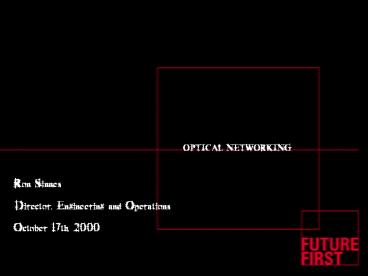OPTICAL NETWORKING - PowerPoint PPT Presentation
1 / 26
Title:
OPTICAL NETWORKING
Description:
DWDM started in the long haul (U.S.) Carriers were running out of fibre ... 'TRADITIONAL' LONG HAUL SOLUTION _Fibre exhaustion on long haul routes, new builds ... – PowerPoint PPT presentation
Number of Views:78
Avg rating:3.0/5.0
Title: OPTICAL NETWORKING
1
OPTICAL NETWORKING
Ron Sinnes Director, Engineering and
Operations October 17th, 2000
2
AGENDA
- Development of Optical Networking
- Market Drivers
- Network Scenarios
- Key Issues for Carriers
3
OPTICAL NETWORKING TIME LINE
Nirvana
Day 1.......2..........3.......Today..........5...
..........6........
Let there be All Optical Networks
Let there be DWDM
In the beginning, Let there be Light
Let there be WDM
Let there be Optical Switching
Let there be Standards (SDH)
4
DAY 1 15 YEARS AGO
Proprietary Fibre Systems
Fibre Pair
- Considered superior to copper systems
- Limited capacity for large space consumed
- Interoperability nearly impossible
5
DAY 2 10 YEARS AGO
Standards-Based (SDH) Fibre Systems
Fibre Pair
- Increased Density
- Interoperability now possible
- Cost reduced due to common components
6
DAY 3 7 YEARS AGO
Passive WDM Coupling
Fibre Pair
WDM
WDM
- Fibre exhaustion alleviated
- Passive components highly reliable
- Very cheap solution
- Broadband laser still in use
7
TODAY 4 YEARS AGO - NOW
Active Component DWDM
Fibre Pair
- Fibre exhaustion alleviated
- Active components including transponders, tunable
lasers, - Wide Band Linear Op Amps
8
MARKET DRIVERS
- DWDM started in the long haul (U.S.)
- Carriers were running out of fibre
- Cost of increasing in STM increments was
expensive - Huge bandwidth demand
- DWDM moved into short haul
- Interexchange fibre exhausted
- Huge bandwidth demand
- Dark Fibre requests
- Non-STM based requirements
9
TRADITIONAL LONG HAUL SOLUTION
- _Fibre exhaustion on long haul routes, new builds
are expensive - _Point-to-Point DWDM systems, including OP Amps
act as fibre multipliers
10
TRADITIONAL METRO SOLUTION
Central Office
Central Office
Central Office
DWDM Rings
- Fibre exhaustion on metro rings
- Point-to-Point DWDM systems, excluding OP Amps
acting as fibre multipliers
11
MOVING TOWARD THE FUTURE
- Optical Services
- High Speed SDH (STM-4, 16, etc)
- Dark Fibre (Unmanaged)
- DIM Fibre (Managed)
- Non-STM Bound Service
- Gigabit Ethernet
- ESCON
- FDDI
- Etc....
12
MOVING TOWARD THE FUTURE
- Carriers need to think about
- Scalability - Look out for future requirements,
not todays limitations - Ubiquity - Any point to any point service
availability - Operational Consistency - Service needs to be
delivered the same every time - Supportability - The integrity of the network
must be maintained
13
TYPICAL CBD NETWORK
14
ADD ONE CUSTOMER, TWO LOCATIONS
- Build a small DWDM ring, connect several
buildings in the process
15
ADD ANOTHER CUSTOMER, TWO LOCATIONS
- Expand the DWDM ring by expanding the fibre
16
ADD ANOTHER CUSTOMER, TWO LOCATIONS
- Build new ring, add new buildings
17
ADD ANOTHER CUSTOMER, TWO LOCATIONS
- Interconnect two rings
18
ADD ANOTHER CUSTOMER, TWO LOCATIONS
- Build a new ring, or expand existing rings, or ??
19
REAL CBD NETWORK
20
ISSUES
- Engineering
- Space (building space is very limited)
- Power (power is very limited)
- Operating Environment (not Central Office)
21
ISSUES
- Operational
- End-to-end Provisioning
- End-to-end Performance Monitoring and Reporting
- Alarm Management
- Wavelength Management
22
OPTICAL NETWORKING TIME LINE
Nirvana
Day 1.......2..........3.......Today..........5...
..........6........
Let there be All Optical Networks
Let there be DWDM
In the beginning, Let there be Light
Let there be WDM
Let there be Optical Switching
Let there be Standards (SDH)
23
SUMMARY
- Day 1, Day 2, Day 3 Fibre networks, standards,
and increasing bandwidth. - Day 4 Increasing bandwidth, but by much bigger
factors (10, 20, 80, 160 .....). - Day 5 Switching light, allowing carriers to
deliver services in the most economical, reliable
and ubiquitous way. - Day 6 All the network elements are in place
- increasing the scope of the optical network to
extend beyond one-off projects - increasing the availability of fibre hand-offs
- creating intelligent optical networks
24
THE FUTURE
- Everything and everyone will be connected to a
Global Network via a fibre interface. - Devices and People on this network will
communicate by exchanging pulses of light. - The network will interpret pulses of light and
determine the desired destination. - Speed, ubiquity and connectivity will be the most
important factors.
25
CONCLUSION
- Optical Networking today is about big bandwidth
and the replacement of copper. - Communications users no longer want Telco
answers, they want communications solutions with
Telco reliability. - Days 5 and 6 are 2-5 years out (maybe longer).
- Vendors, network architects, and network
engineers need to focus on todays problems and
todays solutions with an eye toward the end
goal - .NIRVANA.
26
OUR NETWORK. YOUR SOLUTION































